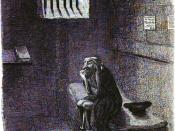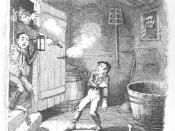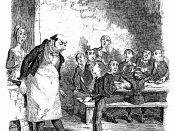Analysis of Major Characters
Oliver Twist
As the child hero of a melodramatic novel of social protest, Oliver Twist is meant to appeal more to our sentiments than to our literary sensibilities. On many levels, Oliver is not a believable character, because although he is raised in corrupt surroundings, his purity and virtue are absolute. Throughout the novel, Dickens uses Oliver's character to challenge the Victorian idea that paupers and criminals are already evil at birth, arguing instead that a corrupt environment is the source of vice. At the same time, Oliver's incorruptibility undermines some of Dickens's assertions. Oliver is shocked and horrified when he sees the Artful Dodger and Charley Bates pick a stranger's pocket and again when he is forced to participate in a burglary. Oliver's moral scruples about the sanctity of property seem inborn in him, just as Dickens's opponents thought that corruption is inborn in poor people.
Furthermore, other pauper children use rough Cockney slang, but Oliver, oddly enough, speaks in proper King's English. His grammatical fastidiousness is also inexplicable, as Oliver presumably is not well-educated. Even when he is abused and manipulated, Oliver does not become angry or indignant. When Sikes and Crackit force him to assist in a robbery, Oliver merely begs to be allowed to "run away and die in the fields." Oliver does not present a complex picture of a person torn between good and evil--instead, he is goodness incarnate.
Even if we might feel that Dickens's social criticism would have been more effective if he had focused on a more complex poor character, like the Artful Dodger or Nancy, the audience for whom Dickens was writing might not have been receptive to such a portrayal. Dickens's Victorian middle-class readers were likely to hold opinions on the poor that were only a...


